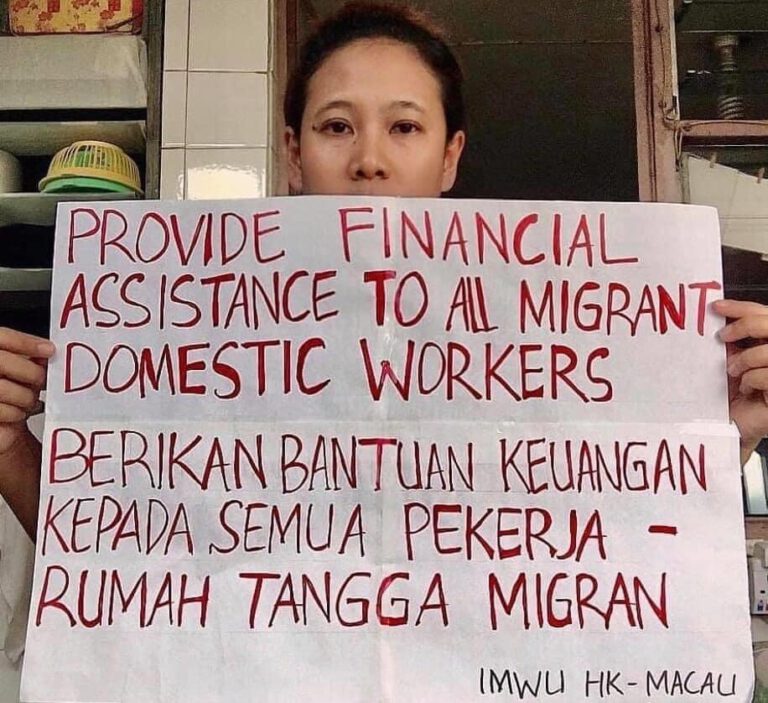
“It doesn’t feel like it has been 7 months that we are in the midst of the COVID-19 pandemic crisis. Various problems ranging from termination of employment, being laid off, cutting wages and holidays, working longer hours, not being given masks and sanitizers, discrimination and stigmatization, being excluded from government financial assistance, being infected and dying while working are a series of concrete effects”, Indonesian Migrant Workers (BMI) said in a statement.
However, amidst the threat of the spread of COVID-19, layoffs and mass deportations, the Indonesian government has again planned to send workers abroad by ratifying KEPMENAKER No.294/2020 concerning the Implementation of Indonesian Migrant Workers during the New Habit Adaptation period on July 29, 2020. This is a step to accelerate Indonesia’s economic recovery, which is expected to experience a recession storm at the end of 2020. By sending 80 thousand prospective BMIs, the government hopes to boost foreign exchange earnings of 3.8 trillion rupiah when the World Bank declares that the remittances of migrants in the world will decrease by 20% due to the pandemic.
Even before the pandemic, BMIs suffered greatly because of the low wage system, wage deprivation, document retention, not having the right to associate, being considered unskilled laborers who did dirty, dangerous and demanding work. Then the pandemic further worsened the situation and condition of Indonesian migrant workers in placement countries, such as being slandered as spreading Covid-19, as spreading fear and causing xenophobia.
The wave of repatriation due to the pandemic is inevitable. The ILO estimates that around 10 million migrant workers are forced to return to their homeland and have to face the problem of poverty in their homeland. In June 2020, as many as 162,000 BMIs had already been sent back to Indonesia.
On the other hand, the lack of employment opportunities in the country will increase the number of unemployed and the poverty rate will also increase. The government through the Minister of Manpower reported that the workforce affected by COVID-19 was around 3.05 million people (as of June 2020) and estimated that additional unemployment could reach 5.23 million.
The scheme for sending BMIs to 14 countries through this new regulation is a manifestation of the government’s failure to create jobs at home and is now forcing BMIs to bet their lives abroad.
Migration of labor abroad is evidence of the failure of government development under the globalization system of neoliberalism and is clearly not a wise “solution”. This action further dismantled the position of BMIs in the eyes of the state, namely nothing more than “merchandise” sold for foreign exchange which would be used to pay foreign debts and fund state development projects. But who really benefits from this development? None other than the elite anti-people in the country and foreign investors.
In the midst of BMIs struggling to live and die to maintain work for the sake of supporting poor families in the country, the State must be present by providing urgent needs such as basic necessities, finance, free decent accommodation, fast free return including for undocumented BMIs, checking tests COVID-19 is free and many more.
In addition, the government must provide assistance to BMIs who return home and their families, such as social assistance in the form of basic necessities, free costs for electricity, water, education and health, in order to survive a pandemic emergency situation.As Migrant Workers and Migrant Worker Families, we must be critical and active against government steps that will harm us.
COVID-19 teaches all of us that we cannot entrust our fate to anyone but ourselves. However, for demands to be a change, we ourselves must be active in organizing and building strength to force the state to be present and to be responsible for us as workers and citizens of Indonesia.
Indonesia still cannot be said to be independent if the majority of its people still suffer from poverty, backwardness and helplessness. Let us give meaning to 75 years of Indonesian independence by continuing to uphold true justice for migrant workers and people who are still marginalized. #
Article published by Indonesian Migrant Workers Alliance on August 17, 2020.